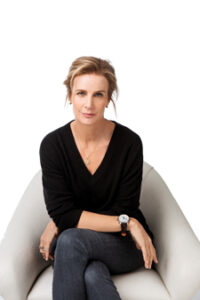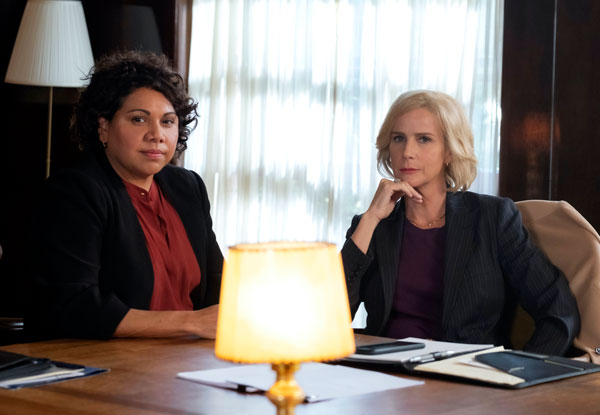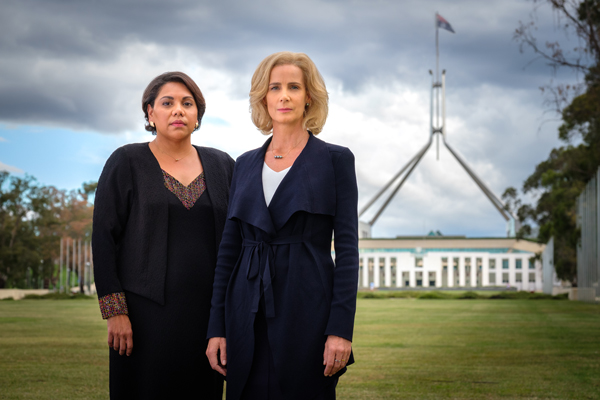 Rachel Griffiths had already made a name for herself on television and in film in her native Australia before landing her breakout U.S. role as Brenda Chenowith in HBO’s Six Feet Under. She followed that up with five seasons as Sarah Walker on Greg Berlanti’s Brothers & Sisters. Griffiths continues to move seamlessly between television and film and between U.S. and Australian productions. Her latest is the ABC Australia commission Total Control (also known as Black B*tch), which she co-created, executive produces and stars in. The timely political drama focuses on an Indigenous woman thrust into the limelight and the embattled prime minister looking to use her as part of a power play. Keshet International distributes the show internationally, alongside Endeavor Content in the U.S.
Rachel Griffiths had already made a name for herself on television and in film in her native Australia before landing her breakout U.S. role as Brenda Chenowith in HBO’s Six Feet Under. She followed that up with five seasons as Sarah Walker on Greg Berlanti’s Brothers & Sisters. Griffiths continues to move seamlessly between television and film and between U.S. and Australian productions. Her latest is the ABC Australia commission Total Control (also known as Black B*tch), which she co-created, executive produces and stars in. The timely political drama focuses on an Indigenous woman thrust into the limelight and the embattled prime minister looking to use her as part of a power play. Keshet International distributes the show internationally, alongside Endeavor Content in the U.S.
TV DRAMA: I understand you had the seed of the idea for the show a long time ago.
GRIFFITHS: I had the seed of an idea, but it’s a bit like saying I have an idea for a superhero who has spider powers! I had a title and pitch, if you like, about our superheroine, an Indigenous senator who is helicoptered in and brings down the government. But the extremely complex fleshing out was not mine. In my original thinking, there was no female PM, so [my character] didn’t exist. I had 5 percent of a germination of an idea!
I pitched the title and a very brief logline to Darren [Dale, at Blackfella Films]. They had been working on their own Indigenous-led political project. Unusually, and similarly to me, they wanted to do it without satire. So many political shows in Australia are either satire or biopics. I guess not many people are interested in the drama of the political sphere. Both Miranda Dear [Blackfella’s head of drama] and Darren were committed to the idea that that could be very fertile ground. What my pitch did for them was shift it to the female and raise the relevancy for them. In my original scheming, subconsciously there was something about that title that came out of a sense that women are so often given language and interrogated or held to standards that are about undermining their legitimacy. So Boris Johnson is the legitimate heir to the Prime Ministership but Theresa May, who had a great sense of diligence and worked very hard to bring her colleagues with her, is seen as illegitimate. Mostly because she is female and somewhat swotty. She can’t prance about with an entitled air! We’re exploring those things. I read a really good piece talking about a radical flavor of the anti-parliamentarianism that is flaring up amongst our democracies. [The show] sits in the political climate of this moment.
TV DRAMA: That’s what I loved about watching the first episode: It felt deeply rooted in Australian culture and politics and touched on themes that I feel like we’re all dealing with in some shape or form, wherever we are.
GRIFFITHS: There are real questions about how to renew our democracies. Democracies are often weakened in the name of the people. So one must be careful that in the course of changing the mechanisms and mores you use to renew democracy, we’re not, in fact, weakening it. Brexit is an extraordinary example of a very simplistic vote that was put to the people and that very simplistic vote is now being used to hold parliamentary democracy hostage. It’s a vote that is hard to account for because there were so many lies upon which it was predicated. I think this show is quite brave in exploring the outsider in politics, the push to make our representatives more representative. I’m sure there are more Etonians in Parliament in England than there are women of color. The notion of the outsider coming in to be uncompromising is also very dangerous. I’ll bring down the government if my party votes this way on something. So the very idea of a broad church is under assault. It’s a zero-sum game moment. You’re with us or against us. It’s quite terrifying.
TV DRAMA: Deborah Mailman is great as incoming Senator Alex Irving. Was she in mind early in the process?
GRIFFITHS: It’s the kind of a show where you want to write for a talent who you know exists. Deborah has won more awards than any other Australian actress and has never been given a lead. The extraordinary thing about Deb is that she is one of those actors where the audience is prepared to walk in her shoes. You can have actors who are really spiky and controversial, and they incite a different feeling within us. We might admire their choices, but you’re not empathizing with them, if you like. And knowing we had Deb, it just gave us permission to keep stretching what we could ask of the audience because we felt she could take the audience a long way.
TV DRAMA: How did you prepare for your role as Prime Minister Rachel Anderson? Were there any real-life politicians you took inspiration from?
GRIFFITHS: I was watching Theresa May quite a lot. I was interested in how women behave under pressure. I had just watched episode six and I wanted to re-voice a few sections where I felt I was a bit weak, [but then I thought], is it just apparent that she is a dead woman walking from the start of the episode? I wondered if that came from my digesting Theresa May’s final months. She went in with confidence thinking she would create consensus and hadn’t quite factored in the recklessness of the hard-liners to have their will, whether that be of the people or not. So yes, I studied her. And [former Australian Prime Minister] Julia Gillard. But because she is a conservative and a true daughter of the party, Theresa May is the model of the centrist, good swotty girl. Brightest in class, and didn’t get there on privilege but on merit.
TV DRAMA: How did you juggle the multiple hats of co-creator, executive producer and star?
GRIFFITHS: I actually think it’s the perfect combination! As an actor, you feel such huge pride that you’re prepared to give everything; there’s that skin in the game. There’s nothing you wouldn’t do to keep seeing the show do well around the world. In many ways, the co-creator job is fairly much done by the time the actor work starts. To me, directing-acting is the grand riddle that makes no sense, even though many extraordinary people seem to pull it off! The history of EPing and participating is quite established, and for good reason. I’m very inspired by many of my colleagues like Nicole [Kidman] and Reese [Witherspoon] and others who have been doing it. It’s becoming quite normal in television.
TV DRAMA: Are you finding that there are more interesting roles in TV rather than film now, especially for women?
GRIFFITHS: That’s certainly why I made the move from primarily doing independent films to television in 2001 with Six Feet Under. At the time, that was quite radical. But as I said at the time, the best script that arrived in my fax machine, as happened then, was the pilot episode of Six Feet Under. It was just such an extraordinary thing, one of the most extraordinary things I had ever read. [Black B*tch] is a great example of having a very complex female character who is both flawed and strong, with six hours to pull it off. In television, a character can be developed in a way that film finds very difficult. I think there’s a great joy for an audience watching a particular actor get tortured over a series! [Laughs] There’s something hugely satisfying, whether that’s six episodes or six years. It’s quite wondrous watching people grow up and gain agency.
TV DRAMA: I still think Six Feet Under has the best series finale ever written.
GRIFFITHS: It’s inarguable that the last 15 minutes of Six Feet Under is possibly the best 15 minutes of cinema, whether that be television or film, ever.
TV DRAMA: We have to talk about the title. ABC is billing it as Total Control.
GRIFFITHS: A national broadcaster has extra sensitivities, especially in an age when it is constantly under attack for being a competitor to for-profit networks who take umbrage about its existence. But also, we are engaging in quite a few outdoor campaigns and appreciate that that title may be difficult to contextualize in an outdoor advertising environment. There’s a lot of talk about it being a title of reclamation. For me, it’s less reclamation and really a title designed to make white people feel uncomfortable and be aware. If white people are uncomfortable with the title, imagine how women of color feel when that is what they are called. So in no way are we trying to normalize it. And in the context of the show, it’s only hurtful.
TV DRAMA: I’ve been watching When They See Us on Netflix and wondering if that kind of show would make it on broadcast television in the U.S. today. How important is it for you that your show is airing on a national public broadcaster in Australia?
GRIFFITHS: I haven’t given up on the broadcasters. The seminal television of my life was Roots. So I don’t think mainstream network television can’t contribute in a significant way to the national conversation. I’m thrilled that this is on the national broadcaster [in Australia]. I certainly think this would not have been made by any of our free-to-air networks. We also wanted it to be seen by the world. The themes it touches on are global. It does one of those rare things where it’s so true of place, it’s so specifically indigenous to Australia, and it has the capacity to resonate elsewhere.
 TVDRAMA
TVDRAMA


